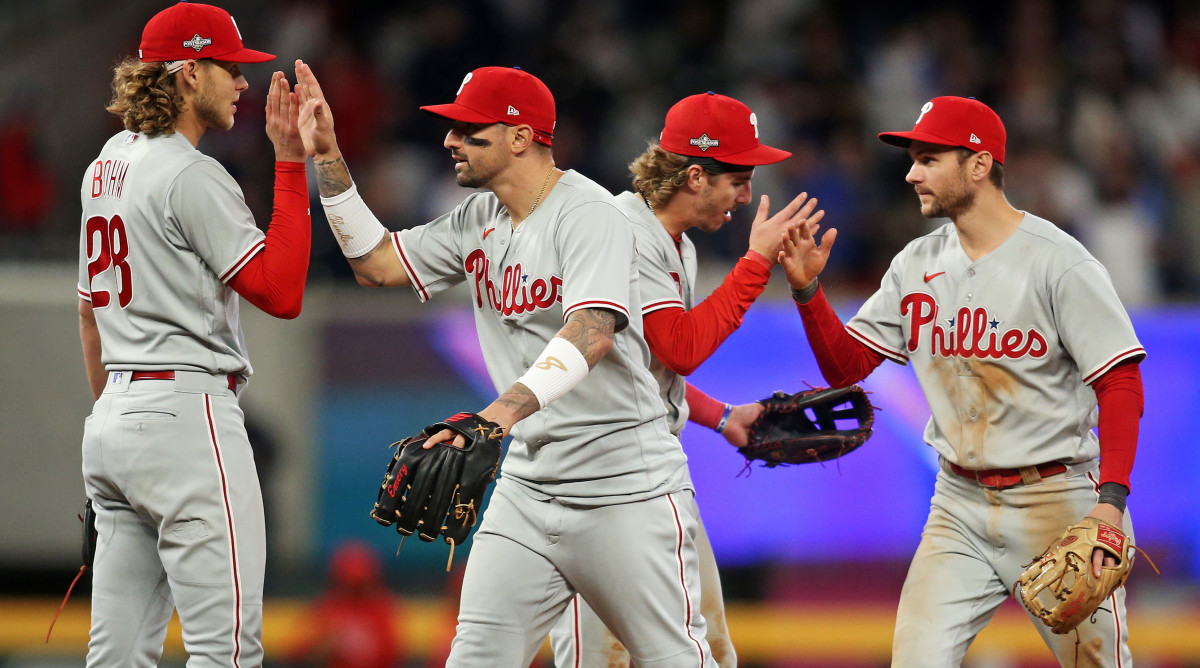Phillies Stars Dim Braves’ Spotlight in Stellar NLDS Game 1 Win

ATLANTA — It was Saturday, which in this part of the world is college football time, so perhaps it was fitting that after their 3–0 win over Atlanta in Game 1 of the National League Division Series, everyone in the Phillies clubhouse wanted to quote former University of Miami linebacker Rohan Marley.
“Big-time players make big-time plays in big-time situations,” said right fielder Brandon Marsh.
Catcher J.T. Realmuto said the same thing, then added, “Our guys did that tonight, and that’s why we won.”
Indeed, this is the series with the most star power: Phillies first baseman Bryce Harper and shortstop Trea Turner, each a $300 million man; Atlanta right fielder Ronald Acuña Jr., first baseman Matt Olson, third baseman Austin Riley and second baseman Ozzie Albies, who all ranked in the top 20 jerseys sold this year. No other playoff team has as many players in either category. Players on both sides admitted that just as baseball fans, they are excited to watch this series play out.
The difference in Game 1 is that one team’s stars played like stars. Atlanta has assembled by some measures the most dangerous lineup in the sport’s history. In its first 2023 playoff game, that offense scored zero runs at home for the first time in two years.
“I think it was more their pitching than our hitting,” said Atlanta manager Brian Snitker.
The Phillies did pitch a brilliant game. But still: Their Nos. 1 and 2 starters were unavailable after the wild card series, so Philadelphia manager Rob Thomson planned on a bullpen game that not everyone knew was a bullpen game. He decided not to inform lefty Ranger Suárez that he would not get a chance to throw more than about four innings. “One thought is that you tell him to empty the tank early,” Thomson explained. “‘Don’t worry about going deep.’ Is that the best message to send him or is it ‘Just go and pitch your game’?” He chose the latter, which Suárez said was the right call. So Suárez went 3 2/3 innings, and six relievers combined to allow four hits.

No one could have predicted this outcome for Atlanta’s stars. Acuña went 0–3 with a walk. With men on first and third and one out in the fifth, he struck out looking. Olson and Riley each had one hit. With runners at first and second in the eighth, Olson turned on a fastball that looked like it might tie the game until center fielder Johan Rojas settled under it. The next batter, Albies, hitting cleanup, grounded into a double play to snuff out the threat.
(Also absent: Good fan behavior, when home plate umpire Brian O’Nora called a catcher’s interference that allowed the Phillies’ third run to score. When replay upheld the call, the crowd booed lustily and dozens of people threw trash onto the field. Atlanta outfielders took cover near the infield while security guards cleaned up. "There's no excuse for that," said Snitker.)
Meanwhile, the big-time Phillies made big-time plays. Turner went only 1-for-4 but stole two bases and, from his knees, turned that eighth-inning double play. “I screamed,” Realmuto said. “I don’t usually do that on the field.” Turner spent his first four months in Philadelphia wondering if he’d ever get another hit, but since early August, he has hit .343 with 16 doubles, 16 home runs and 13 steals.
“He’s dynamic,” said Thomson. “The moment is not too big for him, and he kind of rises to the moment for the most part. We didn’t see that early in the year, but the latter part of the year and so far in the playoffs, that’s the guy that we were thinking we were going to get.”
And Harper did what he so often does: In the sixth inning, with the Phillies leading by a run against Atlanta ace Spencer Strider, Harper looked for anything over the plate. Strider dotted a slider on the inside corner—exactly where he wanted it, he said later—and Harper demolished it at 115 mph into the right field stands. Atlanta has seen this movie before: Harper hit .500 in last year’s iteration of this NLDS, with two home runs and five doubles.
“This is his time of year,” Thomson said.
Yes, October is the best month of the baseball calendar. The sun sets earlier, and the stars come out.
